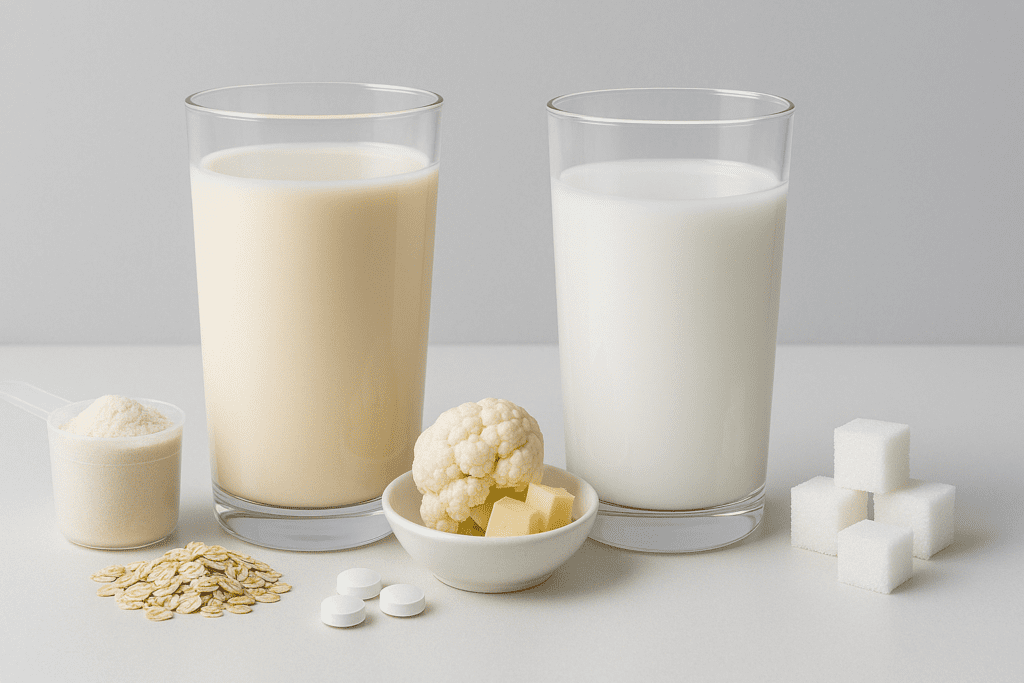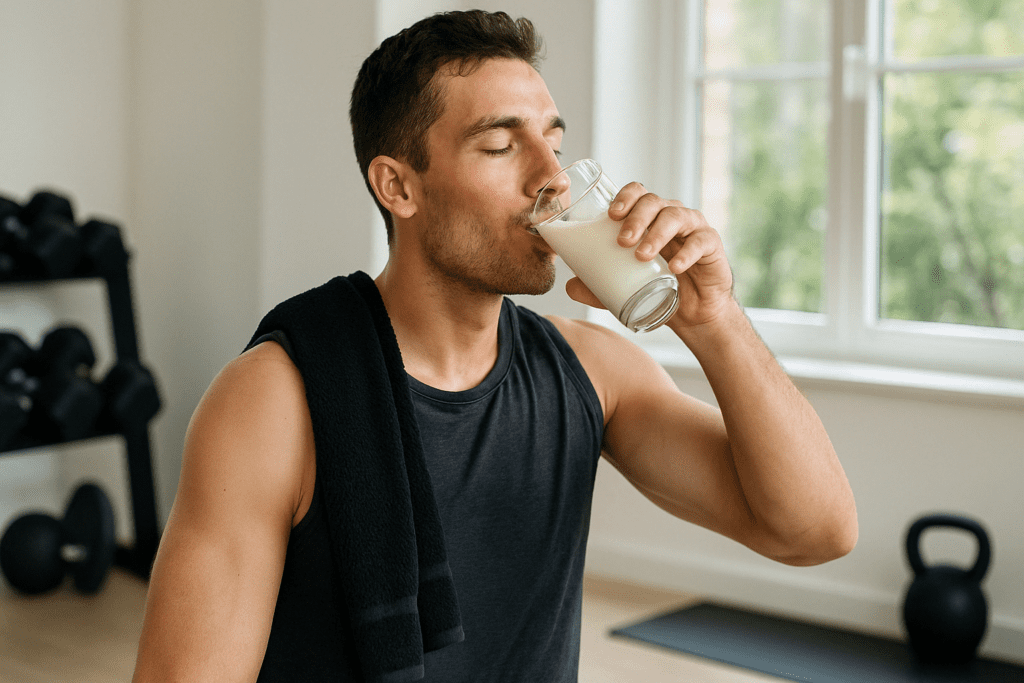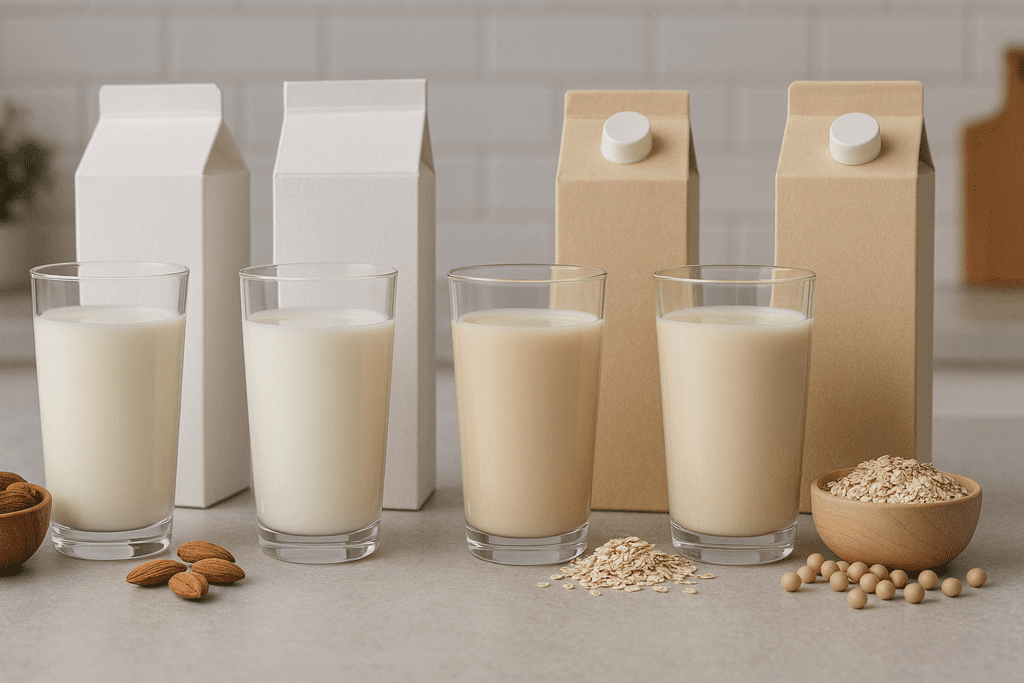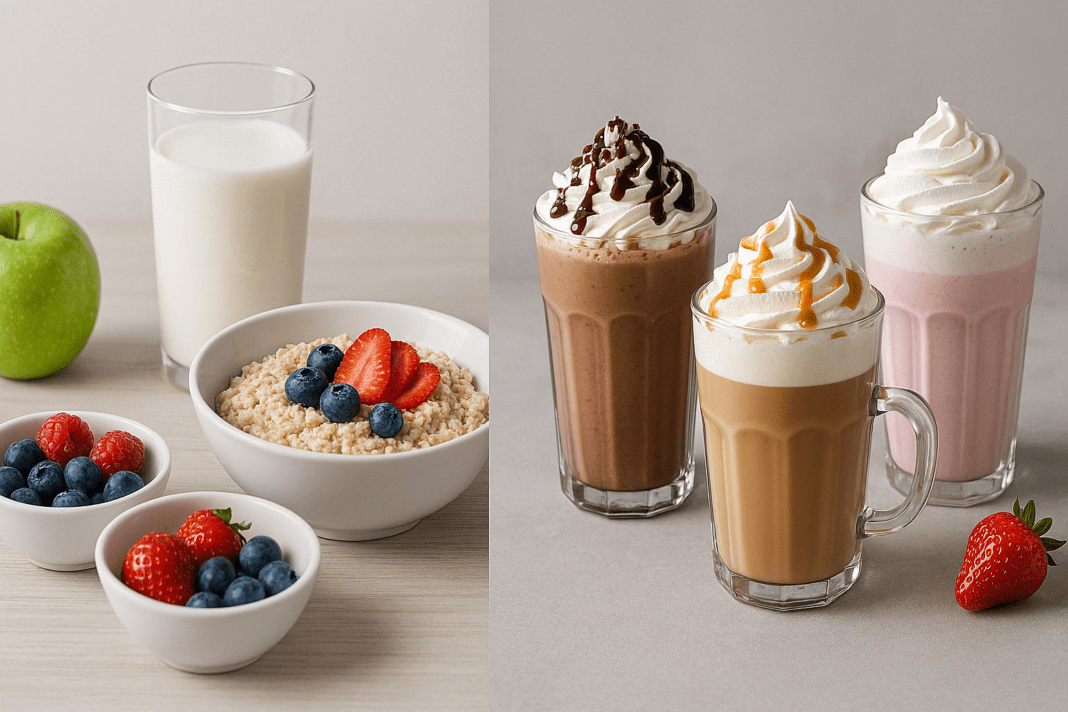Milk has long been considered a staple in many diets around the world. From early childhood through adulthood, it is often promoted as a foundational source of calcium, protein, and essential vitamins. But in today’s health-conscious era—especially in the context of weight management and obesity prevention—many people are beginning to ask new questions. Chief among them is: Is milk good for weight loss or does it hinder progress? While dairy has undeniable nutritional benefits, conflicting opinions and evolving research have stirred confusion about its actual role in a healthy diet, particularly for those trying to lose weight. By examining the evidence and expert opinions, this article will help clarify whether milk is your ally or adversary in achieving your weight goals.
You may also like: Macronutrients vs Micronutrients: What the Simple Definition of Macronutrients Reveals About Your Diet and Health

Understanding Milk’s Nutritional Profile and Its Impact on the Body
Before tackling the question of why does milk hinder weight or whether it supports fat loss, it’s crucial to understand what milk actually contains. A standard glass of cow’s milk is a complex food, offering a combination of macronutrients and micronutrients. Whole milk is rich in fat and calories, with approximately 150 calories per 8-ounce serving. Skim milk, by contrast, removes most of the fat, lowering the calorie count to around 90. Both types offer approximately 8 grams of protein, as well as a range of B vitamins, calcium, potassium, and magnesium.
The high protein content of milk, particularly casein and whey, is known to support satiety, muscle maintenance, and metabolic health. Protein helps to preserve lean muscle mass during caloric restriction, which is critical for healthy and sustainable weight loss. Meanwhile, the calcium in milk has been linked in some studies to fat metabolism, with hypotheses suggesting it might reduce fat absorption in the gut or promote fat excretion. However, these mechanisms remain under scientific debate.
Where milk becomes potentially problematic is in its sugar content. Lactose, the natural sugar in milk, can contribute to calorie intake and, in those who are lactose intolerant, cause digestive distress that disrupts metabolism and nutrient absorption. Furthermore, flavored milk products often contain added sugars that further increase calorie counts and reduce their suitability in a weight loss context. As such, determining whether milk hinders weight loss requires evaluating not just its nutritional benefits, but also the types and quantities consumed.

The Case for Milk Supporting Weight Loss: What the Science Shows
Supporters of milk in a weight loss regimen often cite its protein content and ability to increase satiety. Several clinical studies have demonstrated that diets higher in dairy protein are associated with improved body composition, particularly in overweight individuals. For instance, research published in the journal Obesity Research found that participants who included three servings of dairy daily lost more body fat compared to those who consumed less, even when overall caloric intake was the same.
This effect may be attributed to milk’s ability to regulate appetite hormones such as ghrelin and peptide YY. These hormones influence hunger and fullness signals, and protein-rich dairy can help suppress appetite over the course of a day. Additionally, the synergy of calcium and vitamin D in milk may help modulate fat cell metabolism. Some studies suggest that adequate calcium levels can encourage the body to burn more fat and inhibit fat storage, though this remains an area of ongoing investigation.
In the realm of fitness and muscle retention, milk also plays a positive role. The amino acid profile in milk’s proteins supports muscle protein synthesis, which is crucial when losing weight to ensure the body sheds fat and not muscle mass. Thus, for active individuals, incorporating milk or dairy post-exercise can be a beneficial recovery strategy that also supports body composition goals.

When Milk May Hinder Weight Loss: Practical and Physiological Considerations
Despite its benefits, some individuals find that including milk in their diet actually makes weight management more challenging. The primary concern is caloric density—especially in whole milk and flavored dairy products. While a glass of milk may seem benign, it can quickly add up, especially if consumed multiple times daily or used in smoothies, lattes, or with cereals that are already calorie-rich. This hidden calorie load can quietly sabotage an otherwise well-balanced diet, leading some to ask, “why does milk hinder weight loss when it seems so healthy?”
Another important consideration is how milk affects insulin response. Though it has a low glycemic index, milk has been shown to cause a relatively high insulin response, likely due to its unique protein composition. For individuals with insulin resistance or metabolic syndrome, this can be a concern. Elevated insulin levels can promote fat storage and reduce the body’s ability to burn fat efficiently, particularly when combined with frequent carbohydrate consumption.
Lactose intolerance also presents a barrier. While not directly tied to weight gain, digestive discomfort, bloating, and inflammation from dairy intolerance can affect metabolism and overall wellness, potentially making weight loss more difficult. Moreover, relying heavily on dairy can displace other nutrient-dense, lower-calorie foods from the diet, limiting variety and overall micronutrient intake.

Evaluating Different Types of Milk and Their Weight Loss Implications
The type of milk consumed significantly affects its role in weight management. Whole milk, with its higher fat content, may promote satiety more effectively but contributes more calories per serving. For individuals practicing intermittent fasting or ketogenic diets, whole milk might fit well due to its fat content. However, for those counting calories or following low-fat guidelines, skim or low-fat milk may be preferable.
Plant-based milk alternatives have also surged in popularity, but their weight loss benefits vary widely depending on the formulation. Unsweetened almond milk, for instance, contains far fewer calories than cow’s milk and may help reduce overall energy intake. On the other hand, oat milk and rice milk often contain added sugars and carbohydrates, making them less ideal for certain diets. Soy milk is closer to cow’s milk in terms of protein content, offering a plant-based option with similar satiating effects.
Consumers must also be cautious of flavored or fortified milks, which often contain added sugars, artificial sweeteners, or oils. These ingredients can negate the potential benefits milk might have for weight loss. Reading labels carefully and prioritizing whole, minimally processed options can make a meaningful difference in how milk impacts your health goals.
Personalized Nutrition: The Role of Individual Variability
Not all bodies respond the same way to milk, which is why one-size-fits-all dietary advice can fall short. Factors such as genetics, gut microbiome diversity, lifestyle, and underlying health conditions all influence how milk is processed and whether it supports or undermines weight management. Some people may find that milk helps them feel full longer and supports lean body mass. Others may experience bloating, cravings, or slow weight loss despite an otherwise well-structured eating plan.
The growing field of personalized nutrition seeks to address these individual differences. Tools such as continuous glucose monitors, food sensitivity tests, and DNA-based diet plans aim to provide insights into how specific foods, including milk, affect metabolism and body composition. For those struggling with weight loss despite a balanced diet, investigating whether milk hinders weight loss in their specific case can be an enlightening and empowering step.

Behavioral and Lifestyle Factors Influencing Milk’s Role in Diet
The context in which milk is consumed often plays a critical role in its overall effect on weight. A glass of milk as part of a high-protein, balanced breakfast may help curb appetite and reduce snacking later in the day. However, milk consumed mindlessly in a coffee shop latte loaded with syrup or added to sugar-rich cereal can have the opposite effect. Understanding not just what you eat, but how, when, and why you eat it is fundamental to successful weight loss.
Furthermore, cultural norms and childhood habits around milk can shape adult eating patterns. Many people grow up being told that milk is essential at every meal. While this belief was based on sound nutritional goals, it may not reflect the needs of every adult. Moderation and critical thinking are essential. Simply drinking milk because it is “healthy” without considering context can lead to unintended calorie consumption.
Emotional eating can also be a factor. Comfort foods often include creamy textures and familiar tastes, and milk-based products like ice cream, milkshakes, and chocolate milk are frequently used for emotional soothing. This emotional component can complicate the relationship between milk and weight management. Becoming aware of these tendencies can empower individuals to make more conscious choices and break unhelpful patterns.

Expert Opinions: What Registered Dietitians and Medical Professionals Recommend
Many registered dietitians and nutrition scientists take a moderate stance when it comes to milk and weight loss. Rather than labeling milk as inherently good or bad, they emphasize the importance of context, portion control, and individual tolerance. Dr. Walter Willett of Harvard School of Public Health, for example, has voiced concerns about over-reliance on milk as a health food, particularly when consumed in large quantities. He points out that while dairy can be part of a healthy diet, it is not essential for everyone.
Conversely, experts like Dr. David Katz, founder of the True Health Initiative, argue that dairy’s nutrient density can make it a useful part of a weight-conscious diet when used appropriately. The key, he says, lies in choosing high-quality dairy products without added sugars or excessive processing. Yogurt and kefir, particularly those with live probiotic cultures, may offer additional benefits beyond weight management, such as improved gut health, which is increasingly recognized as a factor in obesity risk.
Clinical nutritionists often recommend that patients trying to lose weight pay attention to total calorie intake and macronutrient balance. For these professionals, the question is less about whether milk hinders weight loss across the board and more about whether it fits into a person’s daily energy needs, food preferences, and digestive comfort.
Frequently Asked Questions (FAQ)
1. Can milk consumption affect weight differently depending on the time of day it’s consumed?
Yes, emerging research suggests that the timing of milk intake may influence metabolic responses and hunger cues. Drinking milk in the morning may promote greater satiety throughout the day due to its protein content, which could support weight management goals. In contrast, consuming milk late at night might interfere with sleep for some individuals due to its insulin-stimulating effects, potentially influencing nighttime metabolism and fat storage. For those asking, “is milk good for weight loss?” the answer may depend not only on what kind of milk you consume but also when you consume it. Understanding how circadian rhythms affect digestion could help explain why, in some cases, milk hinders weight control despite its nutritional value.
2. How does the fermentation of dairy, like in yogurt or kefir, impact weight loss differently than milk?
Fermented dairy products introduce probiotics that can positively influence gut health, which in turn may improve weight regulation. While milk provides essential nutrients, fermented forms like kefir may have an edge in weight loss because they support a healthier microbiome. This can lead to improved digestion, reduced inflammation, and better insulin sensitivity—factors all relevant to those wondering, “is milk good for weight loss in probiotic-rich forms?” Fermented dairy also tends to have a lower lactose content, which may reduce digestive issues for sensitive individuals. These advantages could explain why milk sometimes hinders weight when consumed in its unfermented form but proves more beneficial when fermented.
3. Can the source of milk (e.g., grass-fed vs. conventional) influence its effect on body weight?
Yes, milk from grass-fed cows tends to have a different nutrient profile compared to conventional milk. It contains more omega-3 fatty acids and conjugated linoleic acid (CLA), both of which have been associated with reduced body fat in some studies. For consumers evaluating whether milk is good for weight loss, these subtle nutrient differences may have cumulative metabolic effects over time. However, the impact is modest and often overshadowed by total caloric intake and dietary patterns. Still, choosing grass-fed milk could offer a slight advantage for those seeking to avoid factors that may otherwise hinder weight loss efforts.
4. What role does milk play in appetite regulation for people prone to emotional eating?
Milk, due to its creamy texture and protein content, may act as a comfort food for individuals prone to emotional eating. While it can initially help soothe anxiety or stress, habitual reliance on milk in these situations can lead to unintentional calorie overconsumption. Understanding why milk hinders weight in certain people often starts with exploring psychological associations rather than purely physiological mechanisms. Addressing emotional triggers with non-food coping strategies may help prevent dairy overuse in these contexts. When assessing if milk is good for weight loss, behavioral factors like emotional eating habits should be considered just as seriously as nutritional content.
5. Are there gender-specific differences in how milk affects metabolism and fat storage?
Yes, hormonal variations between men and women can lead to different metabolic responses to dairy consumption. For instance, estrogen has been shown to influence fat distribution and calcium metabolism, potentially making milk slightly more beneficial for weight regulation in women, particularly post-menopause. On the flip side, men may experience greater anabolic effects from milk’s protein, which can support muscle retention during weight loss. These nuances highlight why asking, “is milk good for weight loss?” requires gender-specific insight. In both sexes, however, excessive intake can tip the scale toward explaining why milk hinders weight progress when not consumed mindfully.
6. Can milk impact exercise recovery in a way that influences weight loss outcomes?
Absolutely. Milk is a popular recovery beverage because it offers an optimal blend of carbohydrates and protein, particularly beneficial after resistance training. This combination helps replenish glycogen stores and initiate muscle repair, which may enhance body composition over time. For physically active individuals, milk can be good for weight loss when used to support lean mass retention and recovery. However, for sedentary individuals, the same nutrients could contribute excess calories, subtly shifting the equation to where milk hinders weight control. Aligning milk consumption with physical activity levels is key to maximizing its benefits.
7. How do different types of milk alternatives compare in terms of weight loss potential?
Plant-based alternatives such as almond, oat, or soy milk vary widely in their nutritional composition. Unsweetened almond milk is very low in calories and may help reduce overall energy intake, making it appealing to those exploring whether milk is good for weight loss when replaced with a lower-calorie option. However, oat and rice milk often contain more carbohydrates and added sugars, which could undermine calorie goals. Soy milk, being richer in protein, comes closer to replicating the satiety benefits of dairy milk. Misjudging these differences can be a reason why milk hinders weight when less suitable alternatives are chosen.
8. Is there a connection between milk intake and inflammation that could impact weight loss?
In some individuals, particularly those with dairy sensitivities or autoimmune conditions, milk can trigger low-grade inflammation. This systemic response may disrupt hormone signaling, including leptin and insulin, both of which are critical for weight regulation. While most people tolerate milk well, those with subtle intolerances may experience metabolic resistance that explains why milk hinders weight control despite calorie balance. Switching to lactose-free or fermented options can mitigate this issue without eliminating dairy entirely. So, is milk good for weight loss in everyone? Not necessarily—it depends on the inflammatory response at the individual level.
9. Can milk influence gut-brain signaling pathways that affect weight loss motivation?
Yes, the nutrients in milk, particularly tryptophan and certain bioactive peptides, can influence neurotransmitters such as serotonin. These mood-related chemicals play a role in appetite, reward, and motivation—all of which can support or undermine weight loss efforts. In that light, milk might be good for weight loss when it improves emotional resilience and curbs binge impulses. However, repeated reliance on milk for mood stabilization can blur hunger cues and lead to habitual overeating. Understanding these pathways adds depth to the question of why milk hinders weight in people who unconsciously eat for emotional balance.
10. What future trends in nutritional science could reshape our understanding of milk and weight loss?
Future research is likely to focus on personalized nutrition, exploring how individual genetics and microbiomes dictate responses to milk. Advances in metabolomics and nutrigenomics will allow us to move beyond population-level studies and instead answer, on a case-by-case basis, whether milk is good for weight loss for a specific person. Additionally, innovations in dairy processing, such as enzyme treatment to reduce allergenic properties, may expand the benefits of milk to more individuals. Better understanding of how milk interacts with other dietary components, like fiber or polyphenols, may also help clarify why milk hinders weight in some dietary contexts but not others. As science evolves, so too will the nuanced advice regarding dairy and body composition.
Conclusion: So, Is Milk Good for Weight Loss or Does It Hinder Progress?
When examining the full picture—from nutritional composition and scientific evidence to expert opinion and individual variability—it becomes clear that the answer to the question, “Is milk good for weight loss or does it hinder progress?” is far from absolute. Milk can be both helpful and harmful depending on a person’s dietary patterns, metabolic health, portion sizes, and the type of milk consumed. For some individuals, especially those engaged in resistance training or following higher-protein diets, milk may enhance satiety, support lean muscle mass, and aid in calorie control. For others, especially those with lactose intolerance, metabolic resistance, or a tendency to consume sugary dairy products, milk might hinder weight loss more than help.
Ultimately, the decision to include or limit milk in a weight loss plan should be based on a thoughtful evaluation of one’s goals, preferences, and physiological responses. There is no universally correct approach, but there is great value in staying informed, choosing whole and minimally processed options, and remaining mindful of portion sizes. Whether milk hinders weight loss or helps facilitate it will depend on how it fits within the broader framework of a healthy, balanced, and sustainable diet. As with many nutrition questions, personalization and moderation are the keys to long-term success.
By integrating current research with individual experience, the complex relationship between milk and weight management becomes clearer—not only highlighting the scientific nuances of dairy consumption but also offering practical insights into how to approach milk as part of a modern, mindful approach to nutrition.
Further Reading:
Is Milk Good For Weight Loss? Know The Facts Now!
Effects of dairy intake on body weight and fat: a meta-analysis of randomized controlled trials
Health benefits and risks of consuming milk


